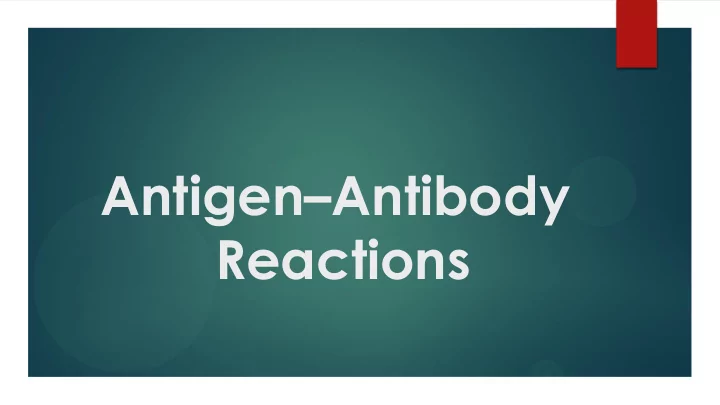

Antigen – Antibody Reactions
The interactions between antigens and antibodies are known as antigen – antibody reactions . The reactions are highly specific, and an antigen reacts only with antibodies produced by itself or with closely related antigens. Since these reactions are essentially specific, they have been used in many diagnostic tests for the detection of either the antigen or the antibody in vitro . The antigen and antibody reactions also form the basis of immunity against microbial diseases in vivo . In the host, it may cause tissue injury in hypersensitivity reactions and in autoimmune diseases.
Factors that affect antigen-antibody reactions include: a. Concentration of the reactants b. Temperature c. Length of incubation d. pH of the test system Classification of Antigen-Antibody reactions: a. Primary phenomenon ( sensitization ) 1) Combination of single antibody to single antigen site. 2) Tests to detect this reaction are technically difficult, complex, expensive, may require special equipment and are time consuming. 3) Techniques utilized to detect this type of reaction include: immunofluorescence, radioimmunoassay and enzyme immunoassay.
b. Secondary phenomenon 1) Basic antigen-antibody reactions are taken a further step, forming cross links or lattice formation to create large molecules that are easily detectable. 2) Methods used to detect these reactions are quick and easy to perform, less expensive, less time consuming and usually do not require special equipment. 3) These methods are less specific, less sensitive and have more interferences. 4) Techniques utilized to detect this type of reaction include precipitation, agglutination and complement fixation
c. Tertiary phenomenon 1) Antigen/antibody reaction is not visible but is detected by the affect the reaction has on tissues or cells. 2) These types of reactions include: inflammation, phagocytosis, deposition of immune complexes, immune adherence, deposition of immune complexes, and chemotaxis.
Antigen-Antibody Binding Primary union of antigen and antibody are depends on two characteristics, affinity and avidity Affinity : is the initial force of attraction that an antibody for a specific antigenic epitope or determinant. Avidity : is the sum of all attractive forces between an antigen and an antibody.
Specificity The term specificity refers to the ability of an individual antibody combining site to react with only one antigenic determinant or the ability of a population of antibody molecules to react with only one antigen. Antigen – antibody reactions usually show a high degree of specificity.
Cross-Reactivity Although antigen – antibody reactions are highly specific, in some cases antibody elicited by one antigen can cross-react with an unrelated antigen. Such cross-reactivity occurs if two different antigens share an identical or very similar epitope. In the latter case, the antibody’s affinity for the cross-reacting epitope is usually less than that for the original epitope. Antisera containing polyclonal antibodies can often be found to cross react with immunogens partially related to those used for immunization, due to the existence of common epitopes or of epitopes with similar configurations.
Recommend
More recommend